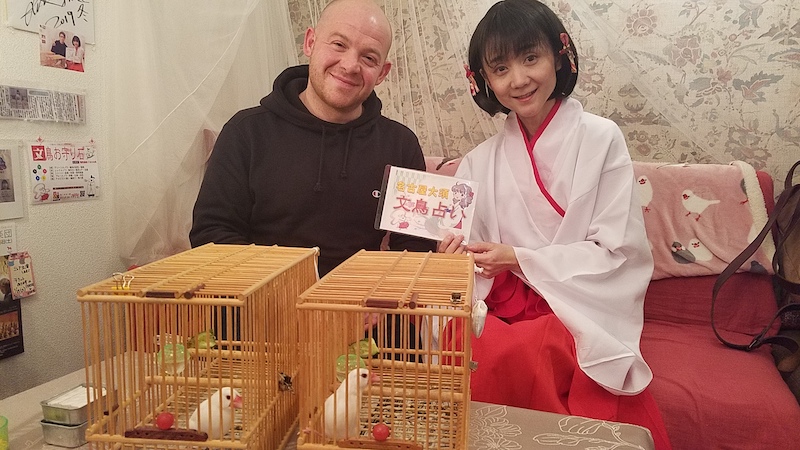Oct 28, 2021
Fortune Telling? It’s for the Birds!
A Japanese proverb says, of the futility of trying to predict the future, ‘when you talk about the future, demons laugh.’ And yet, much of the population believe that the future is already ordained, mapped out in the stars and that if we look to them with just the right eyes, we can discover what our future holds.
Sometimes those eyes come from the most unlikely of places.
Looking for luck
Japan, to paint the nation with a broad cultural brush, is a superstitious country, and whether they are religious or not, most Japanese will pay some lip service to the gods in the hope of channeling luck into their daily lives,
This often comes in the form of talismans, and perhaps the best known of these is the Maneki-neko [beckoning cat]. Originating from a story in which a cat rescued a samurai lord from potential death by lightening by waving him into a shrine, these feline statues, a gold coin around their neck and a raised paw beckoning inwards, are intended to encourage good fortune and health as well as improve business for restaurants, stores, and pachinko parlors.

Shrines and temples, too, are places where good fortune is sought. Visitors will regularly purchase omamori [amulets] and juzu [bead bracelets], hoping that these trinkets will bring success in study, business, good health, and even love. If you have a specific wish, you may write it on an ema [wooden prayer plaques, literally ‘prayer horse’], and this ‘horse’ will carry it off to the prayer-granting spirit enshrined within.
Looking into the future
As well as willing good fortune, the Japanese also believe in looking into the future, with the most common being omikuji. Like more detailed versions of what you might find in a fortune cookie, omikuji are chosen by drawing lots at shrines or temples. On your wooden lot, you will find a number corresponding to a designated fortune ranging from very good to very bad, but should you receive an unfavorable forecast, do not despair. Tie it to a nearby tree or fence and leave it for the spirits to destroy on your behalf.

But these omikuji can only tell you so much, and those who want a more comprehensive look into their future will attend uranai, or fortune tellings.
Fortune tellers can be found all around the country, usually in old shopping arcades where they frequently operate as substitute psychiatrists: Japan is a nation where mental health is still very much a taboo subject. In Nagoya, this area is Osu, which during the Edo Period (1603-1868) was the city’s ‘entertainment’ district filled with bars, brothels, and places of general disrepute. Today it is primarily a shopping center of quirky old stores and, of course, a few fortune tellers—some less ordinary than others.
Ruffling a few feathers
In Osu’s entertainment past, street performers were common, and one such performance included a clairvoyant bird that drew omikuji for its patrons. Today, this form of fortune-telling, called buncho uranai, is no longer common in Japan. However, as if harking back to those libertine days, Mirea Fortune is one of the few places that practice this almost forgotten art.

Like others who aren’t as clever as they think they are, I consider myself highly open to new experiences as long as I can do so with a closed mind. An arched-though-curious eyebrow is my go-to response for anything that errs on the side of mystical. However, upon setting foot inside the store, I promised my wife, Mai-chan, to leave that attitude at the door.
Mirea-sensei, a delightful woman who fizzled with polite charm, seated the pair of us, and as we wrote down our dates and times of birth, she introduced us to her two birds Haku-kun and Bunmaru-chan. They are beautiful, white buncho [Java sparrow], a breed depicted down the centuries in Edo era woodblock prints, had essays written about them by the revered author Natsume Soseki, and are believed to possess a direct line to the gods. Once we were well acquainted, and she had consulted some astrological books, Mirea-sensei began to read Mai-chan’s fortune, and I tried not to roll my eyes. Beginning with her personality, Mirea-sensei described Mai-chan as direct, forward-thinking, and somewhat masculine in her outlook. My eyes stopped mid-swivel. Most people consider Mai to be quiet, reserved, and ‘kawaii,’ as this is the outward persona that she shows the world. However, I know her better than that. She is, in actual fact, precisely as Mirea-sensei explained… That cracking sound you can hear is the hitherto rock-solid wall of my cynicism.

Mirea-sensei described me to a ‘T,’ also. As a flower or sapling type (a perfect accompaniment to Mai-chan’s tree: she can protect me), I am laid back, easy-going, sociable, and sometimes hard working. She missed out devilishly handsome, but four out of five ain’t bad. She even noted my artistic side, though as the business card I had given her said ‘freelance writer’ on it, that should be a given.
Next, it was on to my fortune, and low and behold; it was a corker. It seems that I will have nothing but good luck for the next six years at least, after which I will need a bit of a break. But before I get to my well-deserved rest, this year will be one of a positive professional explosion, and I’ll become famous, to boot. Then, in 2023 my power will grow threefold as long as opportunities are grabbed with both fists. So, if any of you reading this are publishers or literary agents, sign me up right now. Our success is written in the stars!

Once Mirea-sensei had finished her reading, it was time for Haku-kun and Bunmaru-chan to get to work. I steepled my hands and said, in a clear voice, “My name is Mark Guthrie.” Bunmaru-chan looked at me, cocked his head, and then hopped off to a box of omikuji fortune cards. After taking a moment to decide, with his beak, he withdrew one that was ‘slightly lucky’ and instructed me to remain vigilant in my politeness. Not bad, I considered, though Mai-chan took slight umbrage at the idea that in love, I will ‘meet someone who cooperates with [me].’ Once again, I folded my hands and repeated my mantra. This time it was Haku-kun’s turn to move. He danced through his cage and withdrew another card; this time, it was a short message. ‘It’s time to have a rest, it said, which makes sense. If this year is to be one of significant success, I probably should take some downtime while I can, and so we made our way to the pub for a celebratory beer. Well, I had to, right? The gods, through the birds, had spoken. And even I’m not cynical enough to say no to that.

Mirea Fortune Details
Mirea’s service is only in Japanese. As such, if you cannot speak Japanese, you should bring a translator, as I did.
Where: Nagoya, Naka Ward, Osu, 2 Chome−16−12 201 Goshitsu (map)
Website: mirea-fortune.jimdo.com
Images by Mark Guthrie and Mai Ikari


About the author